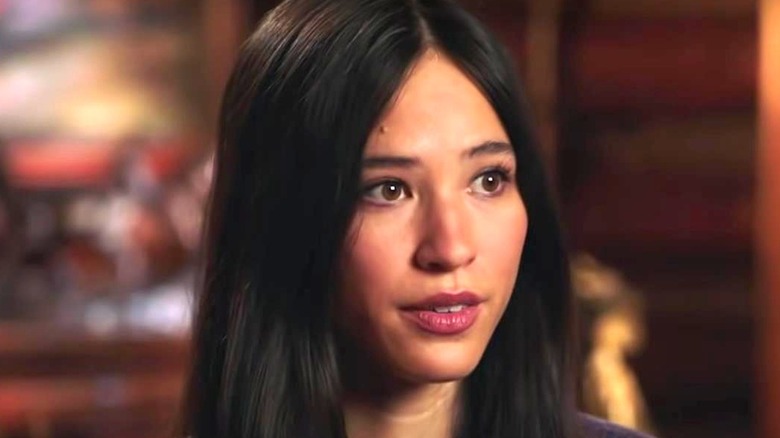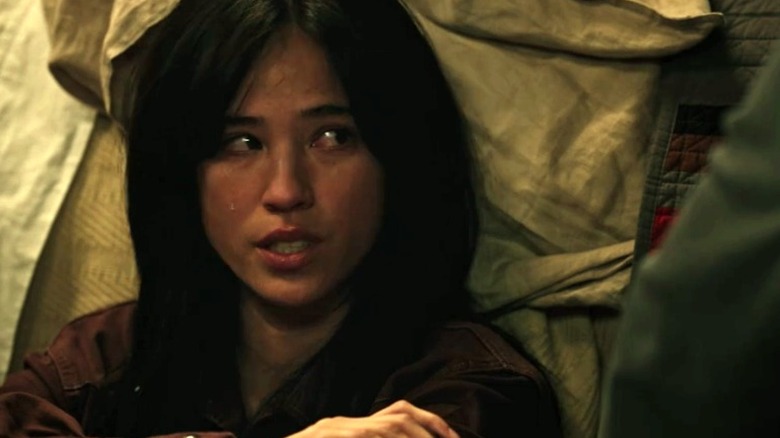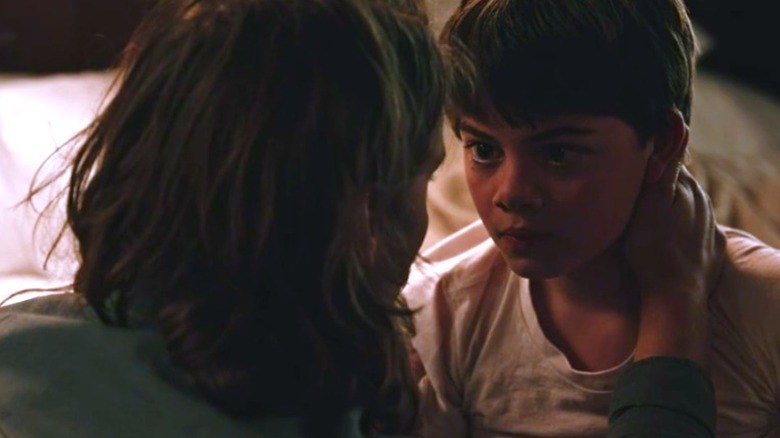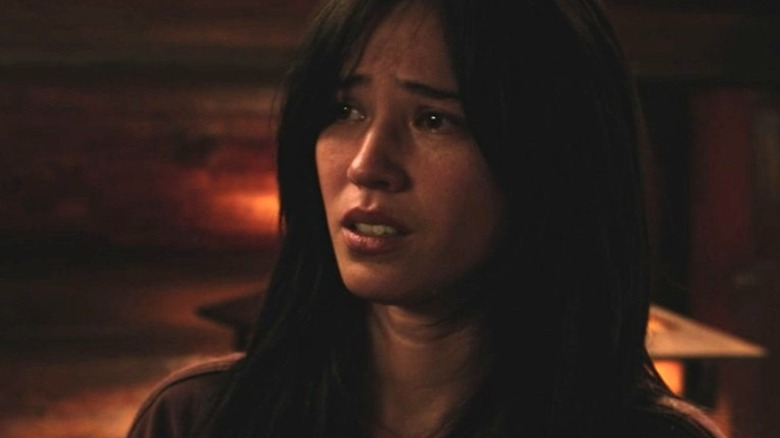Monica's Most Heartbreaking Moment In Yellowstone Season 4
With Season 4 of Taylor Sheridan's "Yellowstone" behind us — and rumors and theories about Season 5 already dominating the internet — it can be easy to forget how some of the season's earlier episodes set the series' characters up to sustain even more tragedy and loss. This is certainly the case for Monica (Kelsey Asbille) and Kayce Dutton (Luke Grimes). After struggling to keep their precariously balanced family together for the series' first three seasons, the couple finally faced some ugly and potentially irreconcilable truths about their dynamic early on in Season 4.
Season 3 concluded with the series' steepest cliffhanger to-date, when an attack on several members on the Dutton family (including Kevin Costner's John Dutton and Kelly Reilly's Beth Dutton) left audiences to wonder who would even survive to see the Season 4 premiere. That premiere — which picked up directly where its predecessor left off — revealed that what viewers witnessed in "The World Is Purple" was only part of the rampant violence experienced by the Duttons and anyone within their immediate orbit. The attack hits the Duttons at their ranch and home, as well, and sees Monica and her young son Tate (Brecken Merrill) in the grips of a traumatic experience that has dire and lasting consequences for both characters. It also pits Monica's reason and rationale against her husband's zealous loyalty to his domineering father.
After experiencing a traumatic event with Tate, Monica is gaslit by Kayce
There are two types of gaslighting. There's the kind Mia Farrow's character is subjected to in "Rosemary's Baby," and the less intentional and menacing — but no less harmful — gaslighting that occurs when one is told that their perfectly rational and sane reactions to an irrational and insane situation are an overreaction at best, or an "insane" reaction at worst. Monica must grapple with the latter in "Yellowstone" Season 4, Episode 3, "All I See is You."
In one of the episode's most heart-wrenching scenes, Monica's son Tate refuses to eat, leave the room, or come out from under the bed in the wake of his traumatic experience in Episode 1 (Nine-year-old Tate had to shoot and kill his mother's attacker, a militia man hired to carry out the hit on the Dutton's and their ranch).
For a child, it's a perfectly normal reaction, but Kayce handles the situation in a way that belies his John Dutton-instilled approach to parenting. It's not Kayce's fault he doesn't have the skills to adequately finesse the situation, but this only adds to the sorrow of the scene by highlighting the cyclical nature of violence and self-righteous belief in one's convictions. Though Kayce eventually removes his wife and son from the ranch in order to keep his family together, what he tells Monica in the Episode 3 scene suggests he'll never actually be able to change, blinded as he is by the mythology of the ranch and his father's ruthless code. Lest we forget, Kayce crossed over to the dark side earlier in the episode when he decided to lock an unruly neighbor in his own cattle guard, rather than take any number of other far more effective, legal, and reasonable actions.
Kayce blames Monica for Tate's trauma
Rather than shoulder any blame whatsoever for the danger in which simply being a Dutton has placed his son (repeatedly), Kayce blames Monica for Tate's PTSD. "He's not scared," he says, "it's you who's making him scared." Never mind the fact that Monica herself (the long-suffering wife that Kayce supposedly loves) has undergone an extremely traumatic situation that involved being dragged across the floor, beaten, and nearly strangled to death by an intruder: In Kayce's eyes, it's Monica's fault Tate hasn't seen a doctor, and Monica's fault Tate is reacting the way he is.
When Monica reminds Kayce that she "begged" him not to move them to the ranch, he merely doubles down. "I told you that this place was evil," she says to him, "I told you (John Dutton) was evil. And now we're all evil."
Viewers blinded by their love for the (let's face it) murderous and criminal Duttons may have agreed with Kayce's response, but the reality is that what Monica is saying is true. Combating evil with evil (particularly when the "hero's" own actions have earned them some of those "evil" enemies) doesn't make either side any more righteous or "good," but Kayce refuses to accept this. "This place isn't evil," he says, "the people who tried to take it from us are evil, and we're not evil for defending it." Not only does the scene illustrate Kayce's ever-hardening transformation into his father (which is already heartbreaking enough for Monica), it's also saturated with an irony that Kayce's unable to see, but of which Monica is all-too-aware ...
Monica sees where Kayce's true loyalties lie in "All I See is You"
John Dutton and his progeny (and, apparently, the series, since Season 4 dropped this conflict almost entirely) might conveniently "forget" that they only own the land upon which their ranch sits because their ancestors took it from Monica's ancestors, but this truth is one Monica can't forget. It's tragically hypocritical (not to mention ignorant) for Kayce, as a white man, to tell his Native American wife that it's "evil" to take what doesn't belong to you. He's so hopped-up on his father's blind belief in the Dutton family's moral superiority that he fails to see the impact it's having on the woman he supposedly loves, and the child he's meant to care for and protect.
Monica's response to Kayce's justification is about the only response that makes any real sense: "I hate you," she says — "I hate you." The most heartbreaking part of all, for both Monica and the well-being of her son, is that she doesn't hate him. Rationally, she knows she should. In the moment, she might even believe that she does. But ultimately, Monica forgives Kayce and welcomes him back when he promises to take his family away from the violence and chaos of the Dutton ranch.
Much has been said about Kayce's season finale "vision" on the mountain, and about him saying he saw "the end of us." On the surface, it appears he means he saw the end of his marriage, but we can't actually know. What we do know is that Monica saw that long before Kayce, in the suffocating isolation of her gilded cage bedroom at the Dutton homestead, as she watched her husband permanently choose a side to which she doesn't — and can't — belong.



